
Brodogradnja
Scope & Guideline
Navigating the Future of Shipbuilding and Marine Technology
Introduction
Aims and Scopes
- Marine Propulsion and Energy Efficiency:
Research on optimizing propulsion systems and improving energy efficiency in marine vessels, including studies on fuel alternatives such as LNG and hydrogen. - Hydrodynamic Performance and Optimization:
Investigation into the hydrodynamic characteristics of vessels, including propeller performance, hull shape optimization, and resistance analysis under various conditions. - Numerical Simulations and Computational Methods:
Utilization of advanced computational fluid dynamics (CFD) and finite element analysis (FEM) for predicting vessel behavior, performance, and safety under different scenarios. - Environmental Impact and Sustainability:
Focus on reducing the environmental footprint of maritime operations, including decarbonization strategies, emissions analysis, and the integration of renewable energy sources. - Maritime Safety and Risk Management:
Studies on enhancing maritime safety through risk assessment, collision avoidance systems, and emergency resource allocation in marine operations. - Innovations in Marine Structures:
Research on the design and analysis of marine structures such as offshore platforms, underwater vehicles, and mooring systems, with a focus on durability and resilience.
Trending and Emerging
- Decarbonization and Alternative Fuels:
A significant increase in research focused on decarbonization strategies, including the use of hydrogen and LNG, indicates a shift towards sustainable practices in shipping. - Autonomous and Remote-operated Vessels:
Growing interest in the design and control of autonomous vessels, showcasing advancements in robotics and AI applications in maritime operations. - Advanced Computational Techniques:
The rise of complex computational methods, such as machine learning and AI, for predictive modeling and optimization in marine engineering demonstrates a trend towards data-driven decision-making. - Environmental Monitoring and Management:
Increased emphasis on studies addressing environmental impacts, such as sedimentation and ecological effects of marine structures, reflects a broader commitment to sustainability in maritime research. - Risk Assessment and Management in Maritime Operations:
Emerging themes related to the evaluation of operational risks and the implementation of robust decision-making frameworks for maritime safety highlight a proactive approach to risk management.
Declining or Waning
- Traditional Shipbuilding Techniques:
Research that focuses solely on conventional shipbuilding methods and materials is becoming less prevalent as the industry shifts towards more innovative, technology-driven practices. - Static Structural Analysis:
Studies that primarily address static analyses without considering dynamic or environmental factors are waning, reflecting a broader trend towards more comprehensive, real-time assessments of vessel performance. - General Maritime Economics:
Papers that discuss maritime economics in a general sense, without integration into specific engineering or technological advancements, have seen a decline as the journal emphasizes more technical contributions.
Similar Journals
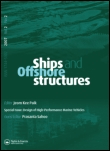
Ships and Offshore Structures
Exploring New Frontiers in Offshore ResearchShips and Offshore Structures, published by Taylor & Francis Ltd, is a premier academic journal dedicated to advancing research in the fields of mechanical and ocean engineering. With an esteemed ISSN of 1744-5302 and an E-ISSN of 1754-212X, this journal has established a strong reputation, reflected in its Q2 ranking in both the Mechanical Engineering and Ocean Engineering categories, as well as its impressive Scopus rankings. The journal provides a platform for the publication of high-quality, peer-reviewed articles that address innovative design, construction, and operational challenges faced in the maritime and offshore industries. Although the journal does not currently offer open access, its accessibility through institutional subscriptions ensures that it remains a valuable resource for researchers, professionals, and students alike. By fostering interdisciplinary dialogue and disseminating cutting-edge research, Ships and Offshore Structures plays a crucial role in shaping the future of marine technology and engineering practices on a global scale.

Journal of Marine Science and Technology-Taiwan
Pioneering insights into the marine world.The Journal of Marine Science and Technology-Taiwan, published by Nant Taiwan Ocean University, is a pivotal academic platform dedicated to the advancement of knowledge in the fields of marine science and engineering. With an ISSN of 1023-2796 and E-ISSN 2709-6998, this journal spans a wide array of topics relevant to the study and application of marine technology from 1998 to 2024. It ranks in the Q3 quartile in major categories such as Mechanical Engineering, Mechanics of Materials, and Ocean Engineering, illustrating its growing influence and the breadth of research it encompasses. Although currently not an open access journal, it provides critical insights to researchers, professionals, and students alike, making significant contributions to the understanding of marine environments and technologies. As the journal continues to evolve, its commitment to high-quality, impactful research remains central to its mission, empowering scholars to drive innovation in the dynamic field of marine science.

Journal of Naval Architecture and Marine Engineering
Charting the Course for Naval ExcellenceJournal of Naval Architecture and Marine Engineering is a distinguished open-access journal dedicated to advancing the field of marine engineering and naval architecture. Published by the ASSOCIATION OF NAVAL ARCHITECTS & MARINE ENGINEERING in Bangladesh, this journal has been a crucial platform for the dissemination of innovative research and practical applications since its transition to open access in 2007. With an impressive Q2 ranking in Ocean Engineering and a well-respected position within the Scopus rankings, it serves a vital role in connecting researchers and industry professionals. Covering a wide scope of topics from hydrodynamics to ship design and marine environmental protection, the journal invites contributions that enhance the knowledge and technology within the maritime sector. Accessed by a global audience, it is an essential resource for those seeking to make significant advancements in naval engineering.
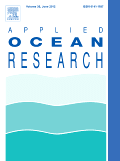
APPLIED OCEAN RESEARCH
Empowering Solutions for a Sustainable Ocean FutureApplied Ocean Research, published by Elsevier Scientific Ltd, stands as a premier journal in the field of ocean engineering, with an impressive impact factor derived from its esteemed reputation and contributions to the discipline. Having been established in 1979, the journal has continually provided a platform for groundbreaking research, fostering innovation and advancement in applied ocean science through a diverse array of topics, including marine technology, coastal engineering, and ocean energy. Currently holding a prestigious Q1 ranking in the Scopus category of Ocean Engineering, with a rank of 10 out of 105 and a notable 90th percentile, Applied Ocean Research is a vital resource for researchers, professionals, and students dedicated to understanding and solving complex challenges linked to ocean environments. Although it provides subscription-based access, the depth and quality of research featured make it a key reference point for those in academia and industry alike. Located in the heart of London, this journal embodies a commitment to excellence in the study of ocean phenomena, positioning itself as a critical conduit for knowledge dissemination and professional growth in this dynamic field.
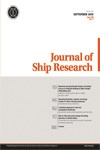
JOURNAL OF SHIP RESEARCH
Pioneering insights in ship research for a sustainable maritime industry.JOURNAL OF SHIP RESEARCH is a premier publication in the field of marine engineering and naval architecture, published by the Society of Naval Architects and Marine Engineers. With a focus on advancing the science and practice of ship design and construction, this journal has become a vital resource for researchers, professionals, and students alike. The journal spans a historical range since its inception in 1969 and provides critical insights and advancements in various related disciplines, highlighted by its strong quartile rankings in Applied Mathematics and Ocean Engineering as of 2023. Although not an open-access publication, it offers valuable research papers that are influential in shaping engineering practices and methodologies across the globe. With an ISSN of 0022-4502 and an E-ISSN of 1542-0604, the journal is available to a broad audience, providing essential knowledge that bridges theory and practical applications in the evolving maritime domain.

International Journal of Maritime Engineering
Pioneering Sustainable Solutions for Maritime ChallengesThe International Journal of Maritime Engineering (ISSN: 1479-8751, E-ISSN: 1740-0716), published by UNIV BUCKINGHAM PRESS in the United Kingdom, is a vital resource for the maritime engineering community, addressing pressing issues in both Environmental Engineering and Ocean Engineering. Established in 2006, this journal serves as a platform for disseminating innovative research, technological advancements, and practical solutions that enhance the sustainability and efficiency of maritime operations. With its current classification in the Q3 quartile for both fields in 2023, it offers valuable insights to researchers, professionals, and students who seek to bridge theoretical knowledge with industry applications. Though the journal does not operate under an open access model, it remains an essential reference for academic discourse and advancement in maritime studies through its rigorous peer-review process and high-level research outputs.
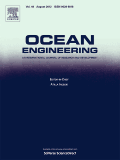
Ocean Engineering
Navigating the Depths of Marine InnovationOcean Engineering, published by PERGAMON-ELSEVIER SCIENCE LTD, is a prestigious peer-reviewed journal that has been at the forefront of marine sciences since its inception in 1968. With an impressive impact factor and recognition in the Q1 quartile of both Environmental Engineering and Ocean Engineering, it stands as a key resource for researchers, professionals, and students alike. This journal focuses on a wide range of topics relevant to the field, including coastal engineering, marine resource management, and ocean dynamics, aiming to bridge theoretical research and practical applications. As ranked 14th in Ocean Engineering according to Scopus, it reflects the influential contributions of its articles and provides a platform for innovative discoveries that advance the field. Although not open-access, it offers diverse subscription options for accessing cutting-edge research. The journal’s ongoing legacy of publishing high-quality research continues to contribute significantly to the advancement of knowledge in ocean-related engineering disciplines.
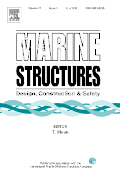
MARINE STRUCTURES
Advancing Knowledge in Ocean EngineeringMARINE STRUCTURES, published by Elsevier Science Ltd, is a premier scholarly journal that has established itself as an essential platform for the dissemination of cutting-edge research in the fields of Marine Engineering, Ocean Engineering, and Materials Science. With an impressive H-index reflecting its substantial citation impact, and boasting a Q1 ranking across several categories including Materials Science and Mechanical Engineering as of 2023, this journal is recognized globally for its contributions to advancing knowledge and innovation in marine structures. The journal covers a wide range of topics, from the design and analysis of marine structures to the latest technologies and methodologies in ocean engineering, making it invaluable for researchers, professionals, and students alike. As the journal continues to publish high-quality articles that explore contemporary challenges and opportunities within the marine domain, it serves as a catalyst for collaboration and knowledge exchange among academia and industry. Researchers are encouraged to submit their original works and benefit from the rigorous peer-review process that ensures the quality and reliability of published content. MARINE STRUCTURES is not currently an open access journal, providing a subscription-based model that facilitates access to its authoritative body of knowledge.
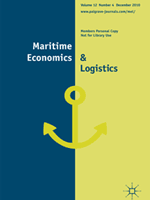
Maritime Economics & Logistics
Transforming Challenges into Solutions in Maritime Economics.Maritime Economics & Logistics, published by Palgrave Macmillan Ltd, is a premier journal in the field of maritime studies, focusing on the intersection of economics, logistics, and transportation. With an impressive impact factor and positioned within the Q1 quartile for *Economics, Econometrics and Finance (miscellaneous)* and Q2 in *Transportation*, this journal is recognized as a beacon of scholarly excellence. Spanning from its inception in 1999 to present, it aims to provide insightful analyses and innovative solutions to the challenges faced by the maritime industry, making it an essential resource for researchers, professionals, and students. With Scopus rankings that place it among the top-tier journals in both *Economics* and *Social Sciences*, it fosters a collaborative environment for the dissemination of cutting-edge research and practical developments in maritime economics and logistics. Join a vibrant community of scholars and enhance your understanding of this critical field.

AIRCRAFT ENGINEERING AND AEROSPACE TECHNOLOGY
Advancing aerospace innovation through rigorous research.AIRCRAFT ENGINEERING AND AEROSPACE TECHNOLOGY, published by Emerald Group Publishing Ltd, is a leading peer-reviewed journal dedicated to advancing the fields of aerospace engineering and technology. With a strong emphasis on innovative research, the journal aims to bridge theoretical developments and practical applications within the aerospace sector. Although the journal does not currently offer open access, it continues to enrich the academic community's understanding of aircraft design, maintenance, and engineering processes, making it a crucial resource for researchers, professionals, and students alike. By fostering a rigorous dialogue among experts, AIRCRAFT ENGINEERING AND AEROSPACE TECHNOLOGY ensures the dissemination of cutting-edge findings and promotes sustainable practices in the aerospace industry, highlighted by its commitment to high-quality scholarship.